- Home
- Adam Thorpe
Between Each Breath Page 9
Between Each Breath Read online
Page 9
As Kaja and her mum caught up with news in their own language, I glanced at the photo on the wall and felt this sort of dark water of sorrow rise up in my chest. I knew what it was: it was the sense that I was drifting without purpose, cut off from my past and seeing no point in the future.
The dad, Mikhel, came in and announced something in his loud, deep voice.
‘He’s mended the other bicycle,’ Kaja explained. ‘Now we can go to the dacha on the power of pedals.’
‘You know you weren’t allowed bicycles in Soviet time?’
‘Really? Wow!’
I wasn’t used to bicycling; while she pedalled painlessly ahead, I got out of breath. I’m stocky, but not overweight. The lanes were bumpy and the vegetation trailed onto them at the sides – my hair was caught by a bramble, at one point.
The dacha had a huge vegetable garden behind, like a London allotment, mainly filled with potato plants that kept the parents going now they had freedom but no money. The house itself was made from surplus-to-requirements breeze blocks and strictly conformed to Soviet limits on size, with two bedrooms tucked up in the sharply angled roof. There was a simple sauna next to the bathroom. The place was entirely pine-cladded on the inside; against one wall there was a greenhouse full of tomato plants. Water was piped from a well; the lavatory was a very deep pit with a conventional toilet seat over it, in an attached shed. The inside of the dacha smelt of pine sap and mossiness and mice. Very like a home I must have dreamed of long before. Reading Coral Island, probably.
Halfway down the garden there was a chicken coop and a large run with about twenty chickens and a pompous-looking cockerel. We collected three eggs from the coop and found four more in various corners of the run, embedded in hay or under dead leaves.
‘They leave them in really crazy places,’ said Kaja.
There were three other neighbouring dachas, but the nearest was an abandoned, shed-like construction with a huge wild plot full of overgrown raspberry and sloe bushes and broken canes. Kaja told me it had belonged to an old couple who were dead now, and their son was a businessman on the mainland.
At the very end of the vegetable garden, before the forest and next to the woodshed, was a cage that smelt like a zoo. It had a scraggy fox inside, pacing up and down, up and down, brushing against the chicken wire with a very cross look on its thin face.
‘That’s my father’s … er, reynard,’ said Kaja.
‘Fox,’ I said. ‘Why?’
‘Why what?’
‘Why keep a fox in a cage?’
Kaja shrugged. ‘It’s been there a few years. My father catched it, I don’t know how.’
‘It’s a bit disturbed, I think.’ I found the idea of a fox in this small cage really unpleasant.
‘Yeah, it’s disturbed. And my father likes to call it names.’
‘Really? You mean rude ones?’
‘Maybe.’
I wasn’t getting very far. Sometimes I wondered if the slightly surreal quality of life around Kaja was due to her English. ‘What’s its real name?’
‘Doesn’t have one. It’s just Rebane, which means fox in Estonian.’
‘Fox. Hi, Fox. Hi, Foxy.’
Foxy looked at us, as he paced up and down, up and down, with a malignant, yellow-eyed glare that I could quite understand. Part of Foxy’s reddish coat was coming away like old carpet. Milly would have thrown a real wobbly seeing this, I thought. A caged fox must also be in my piece for the Dome. Seven minutes of dense experience. A poem of Estonia. Not a gamey song. Multilayered and troubling, more vertical than horizontal. Dense and full of needles, like that tall fir tree.
We stoked up the sauna with wood from the shed, splitting it next to the stove with a small axe. The temperature took an hour to climb to the right level, during which we played strip poker at the table over a glass of local vodka. I got down to my pants and one sock. Kaja was wrapped in her hair, which I thought was cheating. She could all but sit on it. We worried someone might come, like in the old Soviet days. But who?
Then we perched naked together on the sauna’s little bench, watching our skin dry and, quite suddenly, come out all over in tiny clear berries of sweat. It was too hot to hold ourselves tight, although each time we were in the sauna I ran my hand over her supple, slippery form, kissing her salty lips and glistening breasts and bending down to muzzle the wet muff below.
My own sweat tickled me: it amazed me how much I could produce.
We swatched each other with fresh birch twigs soaked in a bucket. This was an entirely new sensation for me. I felt it connected me to the proper green root of things: the pain slight enough to be pleasant, the sweet scent of the shattered leaves emerging through the sweat like something very tender in a distant past that, if it wasn’t mine, ought to have been. Kaja was more enthusiastic with her swatching, at first, but I soon got the hang.
It was all delicious. Her back was very red. Mine was smarting. I found Olev’s card on the floor next to the sauna, dropped out of my trousers, and we laughed at it. Disko, Baar, Saun – 24 hr.
‘So. Where’s the disco, babe?’
‘Instead of the disco, I will sing a song. An old song of Estonia. We used to sing here in secret, with someone to watch by the door for a spy or anyone coming. Or we might be arrested and put in the camps for provoking nationalism.’
‘Promoting. That was brave.’
‘No. What do you think? That we did not have to?’
And she sang, quietly, in the sitting room, wrapped in her towel. It was scary, really, to recognise how far I had forgotten what music could really mean.
I stayed overnight while Kaja returned to the house. I understood this. I started on Anna Karenina. I also worked on the score, scribbling a few more bars inspired by Kaja’s traditional song, then rubbing them out. An owl hooted for half the night, quite close.
The next morning, early, I went off for a long walk on my own, watching cranes fly over the twilit reeds of the wild little bay with its tiny wavelets lapping and lapping, very black between the reed stems. I got some ideas, chromatic stuff to be folded in like yogurt. When I got back, Kaja had still not come. I waited an hour, trying not to worry, and then heard the crunch of her bicycle on the track outside. She had brought milk and bread and Finnish muesli in the pannier. I wanted to pay for them, but she refused.
After lunch we sat reading for a while – in separate easy chairs as the sofa bed was broken. This was strange, sitting in the easy chairs in silence and reading together: it was more intimate and strange than anything we had done so far. At first Kaja read a thick linguistics tome that looked like a scientific treatise. Then she turned to a volume of poems by Akhmatova, in a Russian–Estonian edition. Fortunately, I had read some of Akhmatova’s poems years ago, for a vocal piece about glasnost that never happened. The chair I sat in was old and tatty and awkward. It was hard to concentrate on Tolstoy. Kaja was as beautiful as Anna, for sure.
In the late afternoon I helped lever up the potatoes, laughing with her and crushing the dried heads of dill plants between my fingers. Ever since, the sweet, spicy scent of dill always takes me straight back to that moment, that place. I straightened up and looked about me, as if to fix it all in my memory. The garden’s length beyond the raspberry canes ended in a row of poplars dropping bright yellow leaves in the sea winds.
I was not too fit and thought I’d cricked my back at one point. Kaja dug heartily, stronger in her shoulders than I was, probably. She shook the earth off the creamy, fat potatoes and I realised she had been doing this all her life.
She spent most of the day with me, and we bicycled back for supper. I wanted this to go on and on for good. There again, its very temporary nature was what gave it its sweetness. Its poignancy. Although she didn’t know this. It was around then I decided to call my piece ‘Echo’, in honour of her name and of her.
I liked her parents’ flat.
I told them, without too much untruthfulness, that it reminded me of my own parent
s’ place – also on an estate of ‘social housing’. What I didn’t add was ‘back when I was a child in the sixties’, because the flat here was full of furniture with fake brass handles and vinyl mahogany overlay. There’d be a certain chic to it all in a flat in Richmond, I considered, because it’d be deliberate, bought from a retro shop in somewhere like Brighton. Here it was jaded. The whole island was in a time warp. It felt undecided, stuck between two worlds, emptied of purpose when the troops went. The cranes and the owls had all the purpose. There were no tourists, although before the First World War it was a hydropathic health resort. Kaja explained that people would come from all over Europe, in those days – especially Prussians. The Prussians were haughty, brutal overlords for more than two centuries, beating their Estonian serfs for nothing.
We were walking, at that point in the conversation, past the sanatorium’s successor – a modernist concrete pile built in the thirties, its paint peeling off in white flakes like the kind of disease people hoped to be treated for here. There was a project to renovate the place, she said. Lots of pine beams, very Finnish. She knew the project’s carpenter, he was an old school friend called Toomas. A few bent old folk shuffled about in the drive.
‘Most of the young people have left the island,’ Kaja said. ‘Hardly a person in the fields. There were hundreds in my childhood. It is like: OK, what do we do now? Build a hypermarket? But what for?’
‘And you? Are you ever going to come back? For good, I mean?’
‘I love my island,’ she said, simply. ‘Maybe you will, too.’
And she took my hand and pressed it to her cheek. I’d felt this very tiny beat of revulsion, at that instant. But I showed no sign of it on my face.
The family apartment was always hot, which also reminded me of Hayes and my childhood; the collective heating was on full and could not be individually adjusted, so the windows were kept open to the cold air – Milly would have disapproved of that. That waste. Thermal hole, she’d have called it.
Kaja’s father was still broad in the shoulder and very fit for a man approaching sixty. He pulled out three tatty black-and-white photos from his overalls.
‘Dacha,’ he said.
In the first photo, the kids were small, laughing in the long grass in front of a rectangle of mud marked by poles. In the second photo, Kaja and her brother were holding a bucket between them, like something on a cuckoo clock; a roofless structure of breeze blocks behind them had the dacha’s shape. Their dad was bearded and youthful, dressed in a checked lumberjack’s shirt: he could have been a back-to-the-woods dude, almost. The third photo showed Kaja and her brother as spotty teenagers, shy and kind of angular, standing by an ancient-looking tractor with the vegetable garden just a maze of ruts behind. The photo was badly developed and creased.
Mikhel pointed to the photo and said something in Estonian.
Kaja smiled, translating her father’s words: ‘“I built it for my children, and finish it just when my children were leaving!”’
I pulled a sympathetic face. The photographs were precious, Mikhel explained: a friend had developed them for him in a lab at the rocket station. You couldn’t even buy film, let alone find a photo shop. There was nothing in those days but the certainty of having a job and a roof – for life. I nodded as if Kaja hadn’t already told me all this.
Mikhel stared at the photos for a long time, and then put them away in his pocket.
Kaja’s brother, after studying German in Berlin, would go to Paris and study French. He was clever and received a European scholarship. There was a gulf between the two generations. This was not a problem, Kaja told me: love bridged the distance. I understood this. There was something about the country’s historical suffering that had made this bridge firm. Firmer than my own family’s bridge, which probably didn’t exist except in the Middletons’ wishful thinking.
Whenever I went home to Hayes, I had the impression we were hallooing each other from either side of a canyon – and especially when my parents stood sheepishly in the Richmond house, my mother admiring what she couldn’t see. Once we showed her a little antique oil that Milly had bought me for my birthday, at auction. As usual, I gave subtle hints as to its appearance. It was of a woman bathing: she was modestly wrapped in a fluttering Turkish robe and was testing the water with her foot. Milly was very pleased with the present, although it had cost well into the four Os.
My mother pretended to study it, and then she said: ‘Very nice, but nudes have never been my thing, dear.’
She both despised and worshipped Milly’s wealth. Milly’s and her son’s wealth. Our wealth.
Kaja made a traditional kind of Estonian porridge she called a soup; it tasted like liquid dough, flavoured with nutmeg and cinnamon, and we drank it out of cups. We ate a lot of the soft little cakes and biscuits from her mother’s factory, which a Finnish biscuit company had bought a few months back: the Finns were buying up firms and properties all over Estonia, apparently. I wondered if the heavy porridge pan was the same pan that Kaja’s grandmother had tried to kill her with. I didn’t like to ask. There were no photos of this grandmother. The bad times were so dark.
The family car remained on the blocks, so we cycled everywhere. All the roads bar the one to the ferry harbour were unmetalled; because it had been a military island, they were very wide and ran in straight lines through the forests: I recognised birch and spruce and Scots pine, on and on without a break. Bombers would have used the roads as runways, Kaja told me, in the event of war. That would have meant the end of forests, and of us, and of everything.
‘Except for a few politicians in their bunkers,’ I pointed out. ‘Nice thought.’
‘You’ve a problem with that, or something?’
‘Oh no. I lurve politicians.’
We walked one day on a vast bareness of limestone, with the odd stunted juniper bush and dryish lichens and mosses. There were the rusted, mangled remains of military vehicles among the pebbles. It was barer than a heath: it was as if something had hoovered up all the soil, and yet it attracted me. The sea was a thin silvery line in the distance. A wind buffeted us in gusts, dropping to nothing now and again.
‘This is a very, very delicate area,’ she said. ‘It is called an alvar. It is so rare the word is not even in your dictionaries. Swedish word, I think. A Baltic word.’
‘I like it,’ I said. ‘It makes you think you have to tread carefully.’
‘You do. And they brought tanks on here, the Soviets brought tanks. I remember that.’
‘Nobody treads carefully enough,’ I said, thinking how agreeable I was being, how even Milly would have been impressed. ‘The whole planet is an alvar, really.’
‘Our lives are alvars,’ said Kaja, taking my hand in hers as we walked over the grey waste of pebbles and bared rock. ‘Don’t you think?’
We visited a lot of wooden windmills and large white empty churches and a reconstructed old farm – encouraged as an example of harmless and obsolete folk traditions by the collectivising Russians back in the fifties. I stood next to a wooden sheep with a thick fleece and a pair of antique clippers hanging from its rump and Kaja took a photo as I tried to look handsome and mysterious.
We went back to the farm for a folk festival. I was the only non-Estonian there.
We sat on a bench in the cold barn and watched mostly elderly ladies in brightly coloured traditional Estonian costume dancing heavily in complicated patterns. Almost everyone else in the audience was a participant, and at one point I was dragged off my seat to dance a traditional round. I bobbed about as Kaja watched, smiling and clapping. The hands that kept taking mine were dry and chapped. It was a gas, although I was conscious of my English awkwardness. My recent earth-labouring ancestors would have known how to do it.
Kaja translated the explanations given by the festival organiser, who was a shaggy, grey-bearded man in a thick knitted sweater. He went on too long through a faulty microphone that turned his plosives into gunfire. There was some impas
sioned but very amateur choral work by the same elderly ladies. I listened carefully, but could spot nothing of Arvo Pärt’s origins.
However, the singing of the Estonian national anthem as the flag was raised in the muddy farmyard brought a lump to my throat.
‘This one is called “Eesti Vabaks”,’ Kaja told me, as the singers began the next song, one massive soprano so perfectly out of tune it might have been deliberate, a modernist thing. ‘It was forbidden before. To sing this song meant the camps – straight away, you know?’
I pulled a face, embarrassed to find my eyes moistening. ‘Eesti Vabaks’ sounded like a hymn, it was not intrinsically moving. I was surprised by my reaction – it seemed out of my control, emanating from the damp air, the muddled farmyard modesty of it all.
Kaja leaned against me and I placed my hand around her narrow waist. The elderly women under their quaint cloth caps were watching us without much expression but with obvious interest. I said I was worried that one of them might spill the beans to her parents.
‘So? Who cares?’ she whispered back. ‘We’re not kids. It’s not the Soviet Union any more. Anyway, you think they haven’t guessed?’
The festival went on for three or four hours but there was nothing to eat or drink. I started to flag. I was watching a curio, the last shreds of a life mode that both capitalism and communism had smashed and that could never be put back together again. The elderly women in their spectacles and their bright, felty costumes gave way, after two hours, to an all-woman jazz trio in bright yellow dungarees and baseball caps who played souped-up Cajun.
‘I think I have to leave,’ I said. ‘This is too hip.’
‘Hip? What’s that?’
We made love in the dacha, the forest, the woodshed, on the empty beach (screened by reeds, even so), and once in the apartment, in Kaja’s room, while her mother was talking on the telephone next door.

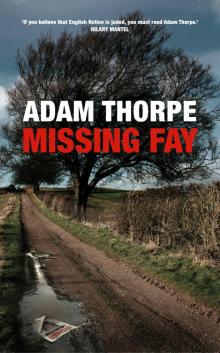 Missing Fay
Missing Fay Hodd
Hodd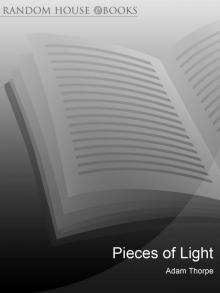 Pieces of Light
Pieces of Light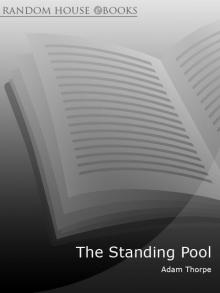 The Standing Pool
The Standing Pool Ulverton
Ulverton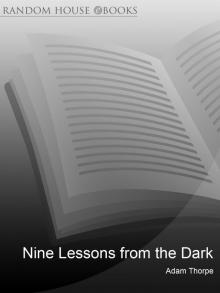 Nine Lessons From the Dark
Nine Lessons From the Dark Flight
Flight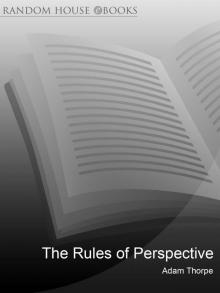 The Rules of Perspective
The Rules of Perspective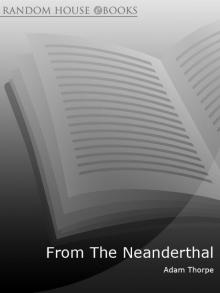 From the Neanderthal
From the Neanderthal Is This the Way You Said?
Is This the Way You Said?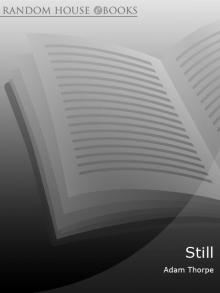 Still
Still No Telling
No Telling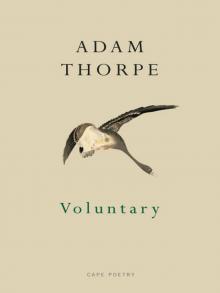 Voluntary
Voluntary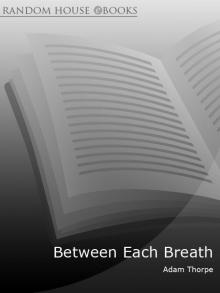 Between Each Breath
Between Each Breath